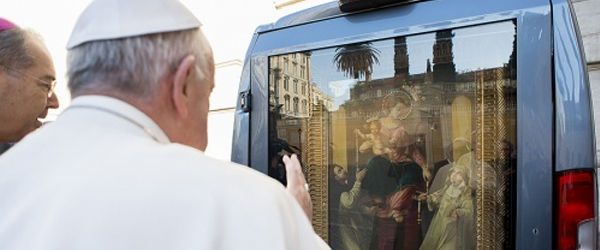Born in Brazil, the young woman was seven years old when she moved with her family to the United States. With her eye on a college education, she progressed through elementary, middle, and high school — only discovering in her senior year that she and the rest of her family were undocumented. Now a transfer student at UCLA, Scarlet Kim — whose family is Korean — can’t get a work permit, and she can’t afford her tuition without getting a job. Still, she said at the Immigration Mass held July 22 at the Cathedral of Our Lady of the Angels, she remains hopeful that new legislation will help her stay in her adopted homeland — legally. “I am committed to making a contribution to society,” she said. Organized by a leadership team of pastors from across the archdiocese working with the archdiocesan Office of Justice and Peace, the Mass drew more than 3,000 worshipers together to celebrate their citizenship — as children of God. “We are all the family of God,” principal celebrant Archbishop José Gomez reiterated numerous times in his homily, as well as at other points during the Mass. “We are the universal family of God,” he said. “One family, drawn from every race and nation.”He emphasized the verse from that day’s Gospel reading in which Jesus’ “heart was moved with pity” for the crowd, “for they were like sheep without a shepherd.”“This is the way God looks at each one of us: with his heart open in tender love. We are his flock he guards,” the archbishop said, adding that “all men and women are created exactly equal: with dignity.“It doesn’t matter where we were born — what nation, race, or people we come from.”Though the Cathedral was filled with an overwhelming number of native Spanish speakers and the archbishop’s homily was in both Spanish and English, the Mass emphasized that the United States is a nation of immigrants from all around the world. “Immigration is not just a Latino issue,” noted Jaime Huerta, associate director of the Office of Justice and Peace, told The Tidings after the Mass. “If you really think about it, all of us are immigrants. That’s what we’re trying to get people to think about in a deeper way.”In addition to Kim, three other Catholics gave testimony about their own immigration experience. Together, the stories formed a mosaic of the contemporary immigrant experience and its impact on families and communities. Monica Enriquez, a parishioner of St. Bridget of Sweden in Van Nuys, spoke tearfully about her experience as a widow at age 27, and her second marriage, which was troubled by her husband’s lack of documentation. When he returned to Mexico to try to rectify the situation, he learned that it would take four to ten years before his papers were fixed. So Enriquez had to decide whether to return to California without her husband and await his return there — or whether to return to California, pack up her four children, and go back to Mexico to wait at his side. She chose the latter, and after four years, the family was able to return to the United States — legally. “I’m here today, together with immigrants all over Los Angeles, seeking justice,” she said. Leo Meyer, a parishioner at St. Stephen in Los Angeles, told a different tale. An ethnic German living in what was then Yugoslavia, he was part of a people persecuted by dictator Josip Broz Tito. But as part of the Displaced Persons Act of 1948, he and his family were able to immigrate to the United States, where they were met and supported by the people of St. Stephen — particularly the pastor, Father Mathias Lani, himself an ethnic German. “At that time, there were bad feelings [in the United States] about the Germans because of World War II,” Meyer recalled, “but the church accepted us.”These testimonies gave attendees an idea of “what it means to be an immigrant in Los Angeles,” said Auxiliary Bishop Alexander Salazar, director of the Office of Justice and Peace, in remarks at the end of the Mass. He explained that it is the parishes that support immigrants in their new communities. He also called for worshipers at the Mass to get involved in the immigration issue. As Archbishop Gomez had said in his homily: “In our world today, there are so many who are sheep looking for a shepherd. We need to be Jesus to the people who have lost their way ... to dedicate ourselves to those who suffer — and especially those who suffer because of their immigration status.“We need to help our society to remember the promise that America is a nation of God, that men and women of every nation live together as brothers,” Archbishop Gomez said. “God is counting on us for this mission.”{gallery width=100 height=100}gallery/2012/0727/immigmass/{/gallery}

